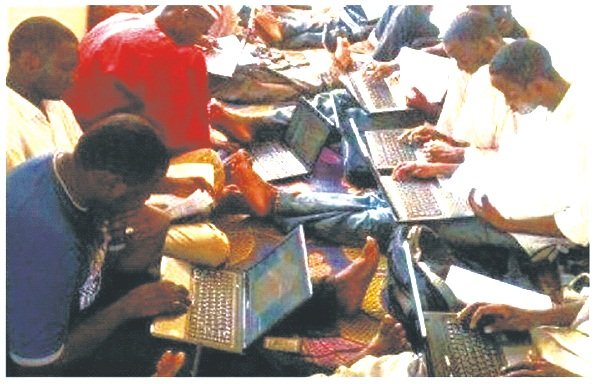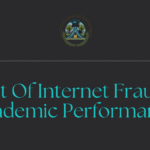The Effect Of Internet-Fraud On Academic Performance Of In-School Adolescents

Internet fraud, commonly referred to as “Yahoo Yahoo” has become a growing concern, particularly among in-school adolescents. This study examines the impact of internet fraud on the academic performance of students, investigating how engagement in fraudulent online activities affects their academic focus, attendance, and overall educational outcomes. The research explores the psychological, social, and educational consequences of this rising trend, shedding light on the factors that contribute to adolescents’ involvement in internet fraud.
The study adopted a mixed-method approach, involving quantitative surveys and qualitative interviews with students, teachers, and school administrators. Data collected from selected secondary schools in Nigeria revealed that students engaged in internet fraud often exhibit declining academic performance, increased absenteeism, and a diminished interest in educational activities. The findings also indicated that the allure of quick financial gains negatively impacts their long-term educational goals and ethical development.
Furthermore, the study identified socio-economic factors, peer influence, and lack of adequate digital literacy education as major contributors to students’ involvement in internet fraud. Parents and educators expressed concern about the deteriorating moral values and the increasing preference for illicit online ventures over legitimate academic pursuits. These insights highlight the urgent need for preventive measures to address this issue and protect the educational system.
The study concludes by recommending targeted interventions, including digital literacy education, school counseling programs, and parental involvement, to curb the menace of internet fraud among in-school adolescents. Strengthening awareness campaigns, implementing strict school policies, and fostering community engagement are essential strategies to mitigate the negative impact of internet fraud on academic performance and ensure the holistic development of Nigerian adolescents.
The advent of the internet has brought significant changes in various aspects of society, including education, communication, and commerce. The use of computers and their related components such as internet-communication-technology and social media are primarily meant to enhance easy access to information and promotion of educational activities of an in-school young adult. This makes research work easier and subject delivery more effective and faster. During the COVID-19 outbreak all over the world, internet-enhanced online teaching, tests, and examinations were seamlessly provided due to the availability of ICT (UNODC, 2020). Students can carry out online work to accomplish their projects (Adepelumi, 2020). Lots of information is made available on the internet for the perusal of students and researchers. Thus, education is brought to the doorstep of every interested person. There is availability of e-libraries and documentaries which could serve as veritable tools for knowledge enhancement.
However, alongside these benefits, the internet has also given rise to new forms of criminal activities, one of the most concerning of which is internet fraud. In Nigeria, internet fraud, often referred to as “Yahoo Yahoo/Street Hustling” has become increasingly prevalent, particularly among in-school adolescents. This phenomenon involves the use of deceptive practices to defraud individuals or organizations for financial gain (Akanbi, and Akanbi, 2018).
Crime-related activities perpetrated through cyberspace have continued to take center stage amongst youngsters in recent times. Earlier than now, cybercrimes like financial fraud through the Internet were more prevalent among youths, regardless of educational level. However, in recent times, it has graduated into a new phenomenon that involves incorporating spiritual elements (Yahoo Plus) with Internet surfing to boost cybercrime success rates (Tade, 2013). Certain perpetrators even take steps further by killing their close female friends or lovers, and ultimately removing essential organs from the bodies of their victims after the horrendous killing for ritual purposes. This incidence has attracted the attention of governments at all levels, but little has been done to stem the unwholesome trend among young adults, particularly, those in secondary and tertiary institutions (Tade, 2013).

In recent years, there has been a growing concern about the involvement of in-school adolescents in secondary schools in Nigeria in internet fraud. This trend is alarming, as it not only reflects a moral decline but also poses a significant threat to the academic performance and prospects of these young individuals. Adolescents, who engage in internet fraud “Yahoo Plus”, are often by the prospect of quick financial gains, which can lead to a range of negative consequences, including a decline in academic performance, loss of interest in education, and engagement in deviant behaviors (Yar, 2019).
This study aims to examine the effects of internet fraud on the academic performance of in-school adolescents in Nigerian secondary schools. It explores how involvement in internet fraud impacts their focus on education, cognitive development, psychological well-being, and overall school experience (Ndubueze, 2019). By understanding these effects, stakeholders, including educators, parents, and policymakers, can develop more effective strategies to combat this growing issue and foster a more conducive learning environment for adolescents. Furthermore, this study seeks to highlight the urgent need for comprehensive interventions that address both the root causes and consequences of internet fraud among adolescents (Nwabueze, and Obasi, 2021). Through this exploration, it is hoped that more awareness will be raised about the dangers of internet fraud and the importance of maintaining academic integrity and focus among secondary school students in Nigeria.
Given the potential negative impacts of internet fraud on the academic performance and future success of in-school adolescents, it is crucial to explore this issue in depth. Understanding the factors driving this behavior, as well as its effects on education, can help in developing effective strategies to combat internet fraud among students (Olumide, Adams, and Amodu, 2016). This study aims to provide a comprehensive analysis of the effects of internet fraud on the academic performance of in-school adolescents in Nigerian secondary schools, highlighting the urgent need for interventions at various levels- family, school, and community- to address this growing problem. Through this exploration, the study seeks to contribute to the existing body of knowledge on internet fraud and its impact on education, while providing valuable insights for educators, policymakers, and other relevant stakeholders to create a safer and more focused educational environment for Nigerian adolescents.
The study revealed a high level of involvement in internet fraud among in-school adolescents in Nigeria, which aligns with existing literature indicating a growing prevalence of cybercrime among youths in developing nations (Okeshola and Adeta, 2013). The pervasive engagement in internet fraud by adolescents reflects a broader societal issue characterized by weakened moral standards and limited access to legitimate opportunities. This behavior is often influenced by peer pressure, socioeconomic challenges, and a desire for quick financial gains (Ajayi, 2020).

A significant finding of this study was the negative contribution of internet fraud involvement to academic performance among in-school adolescents. Ordinarily, effective academic formation requires a serene and conducive environment that promotes focus and intellectual growth. However, the practice of a dishonest lifestyle, characterized by truancy, disruptive behaviors, and a lack of commitment to academic pursuits, creates psychological and behavioral distractions that hinder students from achieving optimal academic outcomes (Umaru and Umma, 2015). As observed in the study, students engaged in internet fraud often face compromised psychological well-being, including heightened anxiety and diminished focus on academic responsibilities.
Despite the clear detrimental impacts, the findings revealed that the magnitude of the effect of internet fraud involvement on academic performance was relatively weak. This suggests that while there is a negative influence, it may not be the sole or most significant factor affecting academic outcomes among Nigerian adolescents. Other factors, such as teacher quality, parental involvement, socio-economic background, and school infrastructure, likely play a more substantial role in determining academic performance (Adeyemi and Adeyemi, 2014).
The findings are consistent with the cognitive dissonance theory, which posits that individuals experience psychological discomfort when their behaviors are inconsistent with their values or societal expectations (Festinger, 1957). Adolescents who engage in internet fraud may experience cognitive dissonance, which could affect their focus and engagement in academic tasks. However, the weak contribution observed suggests that some students may compartmentalize their involvement in internet fraud, maintaining a level of academic focus despite their engagement in dishonest activities.
Furthermore, the minimal contribution of internet fraud involvement to academic performance may be attributed to the adaptability and resilience of some students, who, despite engaging in fraudulent activities, find ways to meet educational requirements. This observation is supported by studies on academic buoyancy, which highlight the capacity of students to overcome everyday academic challenges (Martin and Marsh, 2008).
Conclusion
The study on the effect of internet fraud on the academic performance of in-school adolescents in Nigeria has revealed critical insights. Internet fraud, commonly referred to as “Yahoo Yahoo,” poses significant threats to the educational outcomes, moral development, and prospects of adolescents. The engagement of students in internet-related crimes often leads to absenteeism, poor academic performance, lack of focus, and erosion of core academic values. Moreover, the lure of quick financial gains from internet fraud distracts students from prioritizing their education and long-term career development. The study highlights the need for concerted efforts by schools, parents, and policymakers to combat the influence of internet fraud on adolescents. This can be achieved through digital literacy education, moral reorientation, and the establishment of counseling programs that emphasize the value of hard work and legitimate success. In conclusion, addressing internet fraud among in-school adolescents in Nigeria is crucial to safeguarding the country’s educational system and nurturing responsible future leaders. Fostering awareness campaigns, adopting strict school policies, and leveraging community engagement will be instrumental in mitigating this challenge.
Recommendation
Based on the findings on the effect of internet fraud on the academic performance of in-school adolescents in Nigeria, the following recommendations are proposed:
- Schools should incorporate digital literacy and ethical internet usage into the curriculum to educate students on the responsible use of digital platforms and the consequences of internet fraud.
- Parents should be encouraged to monitor and guide their children’s online activities. Workshops and seminars can help parents better understand internet safety and fraud prevention.
- Schools should provide counseling programs that address moral development, decision-making, and the dangers of internet fraud. Peer counseling initiatives could also be established to engage students in meaningful conversations.
- Government agencies, non-governmental organizations, and educational institutions should conduct awareness campaigns to enlighten adolescents about the legal consequences and social impact of engaging in internet fraud.
- Educational institutions should collaborate with cybersecurity agencies to establish channels for reporting suspected cases of internet fraud and provide information on legal ramifications.
- Schools should develop extracurricular activities that channel adolescents’ energies into productive ventures such as coding clubs, entrepreneurial programs, and skill acquisition workshops.
- Religious and community leaders should play an active role in promoting moral values and creating a supportive environment that dissuades youth from fraudulent activities.
- Educational institutions should enforce policies against fraudulent behavior while promoting reward systems for academic excellence and positive conduct.


